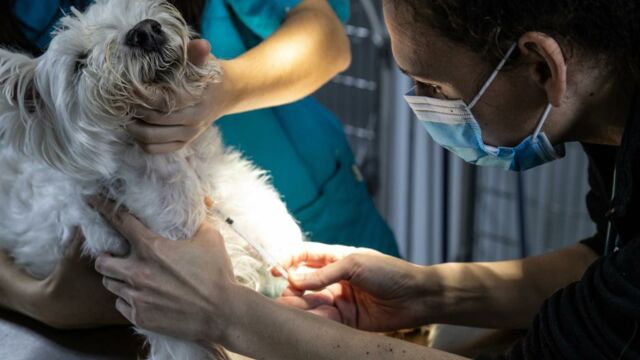Back in March, Russia announced that they were developing a coronavirus vaccine explicitly made for animals. Now, local veterinary clinics in several regions have begun vaccinating their pets against COVID-19.
Discover our latest podcast
Russia begins animal COVID vaccine rollout
Russia has registered the first homegrown animal coronavirus vaccine, called Carnivac-Cov, after trials showed that the jab produced antibodies in cats, dogs, foxes and minks.
Russia’s agriculture safety watchdog Rosselkhoznadzor revealed that 17,000 doses of the Carnivac-Cov vaccine have now been distributed to both state and private veterinary clinics across several regions of the country.
Carnivac-Cov, much like the human coronavirus vaccines, will be administered in two doses, 21 days apart. The animal vaccine will cost around 500 rubles or £5 for the full course of doses. The vaccine is also designed similarly to human COVID vaccines by using a small, inactive piece of the virus that can trigger an immune response without risking infection.
Trials of the vaccine proved harmless and provided an immune response of 100% in animals. Since the trial began in October 2020, health officials revealed that vaccinated animals would also have COVID antibody protection for at least six months, and the effects will continue to be studied. Konstantin Savenkov, Rosselkhoznadzor's deputy head, explained:
The results of the trials allow us to conclude that the vaccine is safe and highly immunogenic as all the vaccinated animals developed antibodies to the coronavirus.
Is vaccinating animals against COVID necessary?
Researchers believe there is no substantial evidence that suggests humans can catch COVID-19 from animals. But, cases worldwide has revealed that multiple species of animals can carry the virus, including cats, dogs, apes, bats and mink. An outbreak of coronavirus was even observed in mink farms last year, resulting in a mass culling of 17 million minks in Denmark.
The World Health Organisation’s team tasked with tracking down the source of COVID-19 also believes that the virus could have been passed on from bats to humans via another animal such as minks or raccoon dogs. However, the pandemic’s origins have been widely debated, with the US opening an official inquiry this week to investigate claims that the virus escaped from a lab in Wuhan.
Since the outbreak, coronavirus cases have also been reported in tigers at the Bronx Zoo and in lions in Spain’s Barcelona Zoo, indicating that the virus may also be passed to animals from humans.
US veterinary pharmaceutical company Zoetis Inc is also on its way to developing a COVID-19 vaccine for animals. Earlier this year, the company began trials on five orangutans and four bonobos at San Diego Zoo after an outbreak amongst other primates.
Alexander Gintsburg, head of the institute that developed Russia's Sputnik V COVID vaccine, was quoted in Izvestia newspaper on Monday, stating: ‘The next stage of the epidemic is the infection with the coronavirus of farm and domestic animals.’
Rosselkhoznadzor also revealed that the use of a COVID vaccine targeting animals could also help to prevent the development of some mutations:
The use of the vaccine, according to Russian researchers, can prevent the development of viral mutations, which most often occur during interspecies transmission of the agent.















